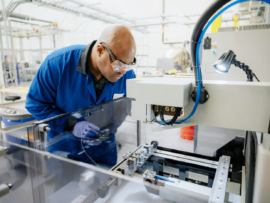
Apple is investing $500 million in the mining company MP Materials to secure a domestic supply of rare earth magnets for its devices. The money will be used to build a manufacturing line for Apple-specific neodymium magnets and a recycling line for rare earth metals.
The new manufacturing line, set to produce magnets for the company to buy from 2027 onwards, will be built at MP Materials’ Independence Magnet Manufacturing Facility in Fort Worth, Texas. In addition to shoring up its own supply, Apple says its investment will help scale the miner’s overall production capacity and support the development of novel magnet materials and processing techniques.
“Rare earth materials are essential for making advanced technology, and this partnership will help strengthen the supply of these vital materials here in the United States,” said Tim Cook, Apple’s CEO, in a statement. “We couldn’t be more excited about the future of American manufacturing, and we will continue to invest in the ingenuity, creativity, and innovative spirit of the American people.”
MP Materials operates the only rare earth mine in the US, based in Mountain Pass, California. The new, commercial-scale recycling line will also be based here, which will take in material from discarded electronics, industrial waste, and other rare metal feedstocks, and reprocess it for use in new Apple products.
The two companies are no strangers to rare earth recycling, having spent nearly five years jointly piloting advanced technologies to ensure the recovered materials meet Apple’s exacting quality standards. Apple says nearly all magnets in its devices are now made from 100% recycled rare earth elements, and it has steadily increased the use of recycled materials in recent iPhone models.
Apple wants to reduce its dependence on China for rare earth metals
Rare earth metals are essential in modern electronics, as they provide the magnetic, optical, and electrical properties needed for key functions, such as motors and sensors. They form components in smartphones, TVs, computers, electric cars, wind turbines, MRI scanners, servers, and many other everyday devices.
China dominates the global supply of these minerals, producing 98% of the world’s gallium and 54% of its germanium. A key reason is that it possesses the only specialised equipment required to extract and process certain rare earth metals (machinery it has banned from export) along with the highly trained workforce needed to operate it.
Apple has sought to reduce its dependence on China since factory shutdowns and other supply chain disruptions severely impacted its ability to meet demand during the COVID-19 pandemic. With its partnership with MP Materials, the company aims to build a domestic talent pipeline by training and employing a US-based workforce in magnet manufacturing.
Furthermore, in February, Apple made a $500 billion commitment to strengthen US infrastructure, manufacturing, and innovation over the next four years. This includes its investment in MP Materials, along with the construction of a Houston facility that will produce servers to support Apple Intelligence.
Trump will be happy to see Apple shoring up its supply chain
The US shares Apple’s goal of reducing its reliance on China. It placed its first set of chip-related export controls on the sale of semiconductors to Beijing in 2022, triggering a series of retaliatory measures between the two countries over access to critical technologies and raw materials.
In April, US President Donald Trump announced sweeping “reciprocal” tariffs on all countries with which the US runs a trade deficit, including a 34% rate for China. The aim was to push companies like Apple to shift their manufacturing to American soil, but doing so could raise the cost of an iPhone as high as $3,500.
Cook’s company has instead planned to develop alternative sites in India and Vietnam as well as increase production in countries outside of China. This did not go down well with Trump, who then threatened to impose a 25% tariff on all iPhones manufactured outside the US, marking a U-turn on the administration’s earlier exemption for electronics from reciprocal tariffs.
This week’s announcement could help repair the relationship between Trump and Cook. The Department of Defense has already thrown support behind MP Materials by buying $400 million worth of convertible preferred stock and becoming its largest shareholder.
Apple is not the only tech company looking to get on Trump’s good side. Read about how Texas Instruments and TSMC have recently committed tens of billions of dollars towards US manufacturing.




